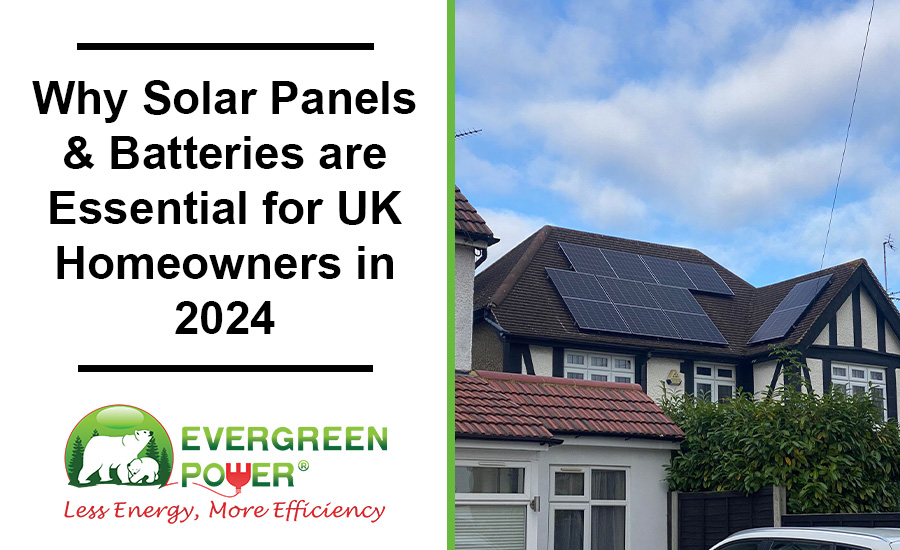
Introduction
With energy prices continuing to rise and climate change a growing concern, installing solar panels and home batteries is more essential than ever for UK homeowners in 2024. This year presents a unique opportunity to take control of your energy costs and usage like never before.
Several key factors make 2024 the ideal time to go solar: improved solar panels in UK efficiency, rapidly decreasing costs, the proliferation of home battery storage, ease of installation, and increased energy independence. This article will explore why solar battery are essential for UK homes and how you can benefit from this renewable energy revolution.
The days of solar being seen as an expensive niche product are over. Between affordable systems and long-term savings, solar and batteries make financial and environmental sense for most British households. Read on to understand why 2024 will be the year solar becomes an essential part of powering UK homes into the future.
Rising Energy Prices
The UK is experiencing an unprecedented energy crisis, with skyrocketing household electricity and gas bills. The average household energy bill increased by 54% in 2023, and analysts project that bills could rise again by another 50-60% in the next 2-3 years. This is putting tremendous financial strain on homeowners, who are facing rapidly escalating costs just to keep the lights on and their homes heated.
Meanwhile, solar panels and home battery storage costs continue to decrease. Installing solar panels allows homeowners to generate renewable electricity, protecting them from volatile grid prices. Once the solar panels are paid off, their electricity is essentially free. This provides long-term savings versus relying solely on increasingly expensive grid electricity. Experts estimate solar panels can cut a household’s electric bill by 50-70%.
With energy bills spiralling out of control, solar panels allow homeowners to regain control over their energy costs. The savings from solar panels versus grid electricity will continue to grow as energy prices rise in the years ahead. Going solar provides a safeguard for UK homeowners against surging electricity costs.
Climate Change and the Need for Renewables
The climate crisis is one of the most pressing issues facing today. The UK has ambitious goals to reach net zero carbon emissions by 2050. To achieve this target, drastic reductions in fossil fuel usage are required across all sectors. Home energy consumption accounts for over a quarter of the UK’s carbon emissions, making greening our homes essential.
Solar panels can play a crucial role in slashing home carbon footprints. Generating your renewable electricity from sunlight avoids emissions from fossil fuel power plants. Installing a typical 4kW solar system saves around 1.5 tonnes of CO2 annually. Widespread adoption would significantly reduce the UK’s carbon emissions. Solar panels paired with batteries also enable homes to rely less on polluting gas power plants during peak demand times.
Beyond cutting emissions, solar panels reduce other environmental impacts. Conventional electricity from the grid relies heavily on burning coal and natural gas. The extraction, processing, and transportation of these fossil fuels damages ecosystems. Solar energy production creates no air or water pollution. The panels’ manufacturing process has some emissions, but the clean energy generated over their 25+ year lifespan far outweighs this.
Transitioning to solar power brings the UK closer to its climate change commitments. Generating clean energy at home benefits the environment and reduces our reliance on fossil fuels. For eco-conscious homeowners, installing solar panels is one of the most impactful steps that they can take.
Improved Solar Panel Efficiency
Solar panel technology has improved dramatically over the past decade. The most common solar panels on homes are made of monocrystalline silicon and have average efficiencies of around 15-25%. However, new technology developments have pushed solar panel efficiency even higher.
Decreasing Costs
Solar panels and battery storage costs have dropped dramatically in recent years, making solar energy much more affordable for UK homeowners. The average solar PV system installation cost has fallen by over 60% in the last decade. Many factors have contributed to these declining costs:
– Improved manufacturing and installation processes have driven down the prices of solar panels and batteries. Mass production and economies of scale have enabled manufacturers to produce solar equipment more efficiently.
– Technological advancements have increased the efficiency of solar panels, allowing homeowners to generate more electricity with fewer panels. Today’s average solar panel converts over 20% of sunlight into electricity, compared to 15% a decade ago. More efficient panels reduce the system size and cost.
– Strong global demand for solar power has expanded the market and spurred further innovation in the solar industry. More competition between equipment providers has also reduced costs.
– Government incentives like the Smart Export Guarantee have helped offset upfront costs of installing solar power. Homeowners can sell excess solar electricity back to the grid for additional savings.
The return on investment for a home solar system depends on system size, electricity usage, and location – but is typically between 5 to 10 years. With electricity prices projected to keep rising, solar power will deliver increasing savings over a system’s 25+ year lifespan. The falling prices make solar energy highly attractive financially for any homeowner taking a long-term view.
Battery Storage
One of the best ways to maximize solar panel systems is by pairing them with home battery storage. This allows any excess solar energy generated during the day to be stored and used later rather than exported to the grid. Home battery prices have fallen dramatically in recent years, with new entrants and improved technology driving costs down.
Growatt battery is one of the most well-known, but many options are now available from brands like Sunsynk, Tesla, GivEnergy, and more. These sleek, wall-mounted lithium-ion batteries can store between 3 and 12 kWh of energy. That’s enough to power critical appliances and lighting for extended periods. With intelligent software, the batteries automatically charge when solar generation is abundant and discharge when required.
Adding battery storage gives homeowners much greater energy independence and resilience. Rather than solely relying on the grid, you have your energy store to tap into. This can provide backup power during blackouts or allow you to maximize the self-consumption of the solar energy you produce. As battery costs fall further, pairing them with solar will become increasingly compelling for UK homeowners.
Government Incentives
The UK government offers several incentives to encourage homeowners to install solar panels and batteries. The main incentive is the Smart Export Guarantee (SEG), which requires energy suppliers to pay households for excess solar electricity exported to the grid. The SEG rate varies by supplier but averages around 5.5p/kWh.
The SEG replaced the previous Feed-in Tariff (FiT) scheme, which closed to new applicants in 2019. Homes already receiving FiT payments can continue until the scheme ends in 2029. FiT rates were much more generous than SEG, often over 10p/kWh.
The UK government previously offered grants for solar batteries under the Energy Company Obligation scheme. However, the battery grant was discontinued in 2018 due to low uptake. No direct grants or subsidies are available from the national government specifically for home solar battery systems.
Ease of Installation
In recent years, installing solar panels on your home has become much easier and more affordable. The process typically involves a site survey, system design, permitting, installation, and local utility approval.
Advances in modular panel design and racking systems have streamlined installation time and costs. Panels can now be mounted on roof racks or ground mounted solar panels uk quickly without penetrating the roof, reducing roof leaks and damage. Most solar installers use professional crews to mount and connect a typical home system in 2 to 3 days.
AC Couple Inverter Charger Installation uk have also improved, allowing for plug-and-play connections. And with wireless monitoring, homeowners can use simple wiring throughout the house.
Permitting and utility connections have been simplified, too. Many local authorities have standard solar permits, making the paperwork effortless. And utilities have implemented net metering programs, which make connecting to the grid seamless.
The rise of solar leasing and PPAs has removed the high upfront equipment cost barrier. Now homeowners can go solar for little to no money down and pay through their electric savings. This makes the transition affordable and accessible.
Overall, solar installation is faster, cheaper, and more accessible than ever. More trained installers offer competitive pricing. The equipment is standardized and easy to integrate. Financing options remove initial cost hurdles. Going solar is a great choice to make your home more sustainable.
Increased Energy Independence
Installing solar panels and batteries allows homeowners to become more energy-independent by producing renewable electricity instead of relying solely on the grid. This brings several key benefits:
·Energy security – Homeowners control their energy production with solar and batteries. This provides a buffer against potential grid instability or electricity supply issues. Even if the power goes out, solar panels can keep producing electricity stored in the home battery.
·Avoid grid upgrades – In some areas, the local grid struggles to meet peak energy demand. By installing a solar and battery system, homeowners reduce strain on the grid during peak times. This helps avoid expensive grid upgrades that would otherwise get passed onto consumers through higher electricity bills.
·Lower exposure to rising energy prices – Electricity prices have soared in the UK, increasing pressure on household budgets. With solar panels, homeowners lock in lower electricity rates for decades. Any excess solar electricity they export back to the grid also earns them money through export tariffs.
·Hedge against future fossil fuel supply issues – As global oil and gas reserves decline, energy prices will likely rise. However, with solar panels, homeowners are guaranteed access to free renewable energy for 25+ years. This provides an inflation-proof hedge against potentially higher electricity bills down the road.
In summary, homeowners gain increased energy independence, resilience, and price stability by taking control of their energy production. This makes solar panels with battery storage a precious investment for UK homeowners looking to reduce reliance on the grid in 2024 and beyond.
Conclusion
Solar panels and home battery storage will provide clear benefits for UK homeowners in 2024. With rising energy prices, climate change concerns, improved solar technology, decreasing costs, battery backup capabilities, government incentives, and easier installation, going solar makes sense.
This year presents a prime opportunity for homeowners to control their energy production and reduce grid dependence. Installing solar panels and batteries will save money on electric bills, increase energy independence, and help the environment. The investment will pay off over the long term.
Evergreen Power UK has been installing solar panels and batteries across the UK for the past 11 years and has helped thousands of customers save money and do their bit for the environment. Homeowners worried about relying on the grid or wanting to contribute to the fight against climate change should strongly consider solar and storage in 2024. Go solar now for savings, sustainability, and peace of mind. The time is right to power your home with the sun.
